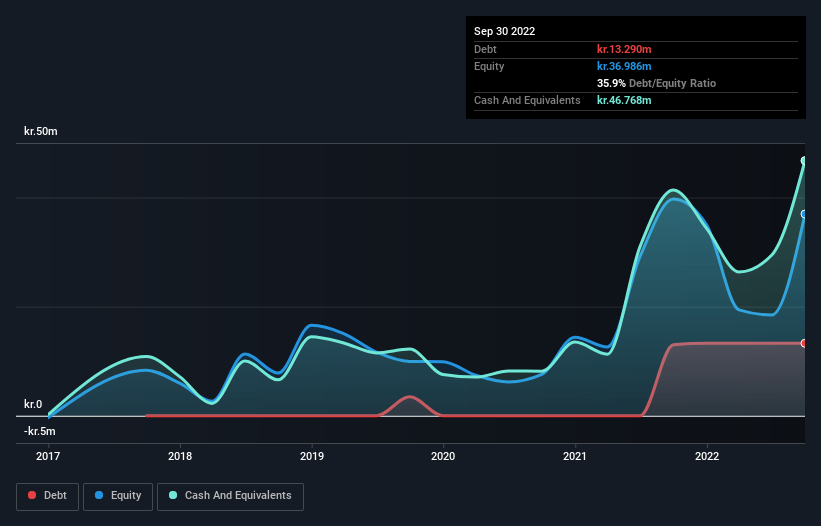
The external fund manager backed by Berkshire Hathaway's Charlie Munger, Li Lu, makes no bones about it when he says 'The biggest investment risk is not the volatility of prices, but whether you will suffer a permanent loss of capital.' So it seems the smart money knows that debt - which is usually involved in bankruptcies - is a very important factor, when you assess how risky a company is. Importantly, Initiator Pharma A/S (STO:INIT) does carry debt. But is this debt a concern to shareholders?
When Is Debt A Problem?
Debt and other liabilities become risky for a business when it cannot easily fulfill those obligations, either with free cash flow or by raising capital at an attractive price. In the worst case scenario, a company can go bankrupt if it cannot pay its creditors. While that is not too common, we often do see indebted companies permanently diluting shareholders because lenders force them to raise capital at a distressed price. Of course, debt can be an important tool in businesses, particularly capital heavy businesses. When we think about a company's use of debt, we first look at cash and debt together.
View our latest analysis for Initiator Pharma
How Much Debt Does Initiator Pharma Carry?
The chart below, which you can click on for greater detail, shows that Initiator Pharma had kr.13.3m in debt in September 2022; about the same as the year before. But it also has kr.46.8m in cash to offset that, meaning it has kr.33.5m net cash.

A Look At Initiator Pharma's Liabilities
According to the last reported balance sheet, Initiator Pharma had liabilities of kr.2.81m due within 12 months, and liabilities of kr.13.3m due beyond 12 months. On the other hand, it had cash of kr.46.8m and kr.3.65m worth of receivables due within a year. So it actually has kr.34.3m more liquid assets than total liabilities.
This surplus suggests that Initiator Pharma has a conservative balance sheet, and could probably eliminate its debt without much difficulty. Simply put, the fact that Initiator Pharma has more cash than debt is arguably a good indication that it can manage its debt safely. When analysing debt levels, the balance sheet is the obvious place to start. But it is future earnings, more than anything, that will determine Initiator Pharma's ability to maintain a healthy balance sheet going forward. So if you want to see what the professionals think, you might find this free report on analyst profit forecasts to be interesting.
Given its lack of meaningful operating revenue, Initiator Pharma shareholders no doubt hope it can fund itself until it has a profitable product.
So How Risky Is Initiator Pharma?
We have no doubt that loss making companies are, in general, riskier than profitable ones. And we do note that Initiator Pharma had an earnings before interest and tax (EBIT) loss, over the last year. Indeed, in that time it burnt through kr.32m of cash and made a loss of kr.40m. With only kr.33.5m on the balance sheet, it would appear that its going to need to raise capital again soon. Even though its balance sheet seems sufficiently liquid, debt always makes us a little nervous if a company doesn't produce free cash flow regularly. When analysing debt levels, the balance sheet is the obvious place to start. However, not all investment risk resides within the balance sheet - far from it. For instance, we've identified 3 warning signs for Initiator Pharma (1 doesn't sit too well with us) you should be aware of.
When all is said and done, sometimes its easier to focus on companies that don't even need debt. Readers can access a list of growth stocks with zero net debt 100% free, right now.
If you're looking to trade Initiator Pharma, open an account with the lowest-cost platform trusted by professionals, Interactive Brokers.
With clients in over 200 countries and territories, and access to 160 markets, IBKR lets you trade stocks, options, futures, forex, bonds and funds from a single integrated account.
Enjoy no hidden fees, no account minimums, and FX conversion rates as low as 0.03%, far better than what most brokers offer.
Sponsored ContentNew: AI Stock Screener & Alerts
Our new AI Stock Screener scans the market every day to uncover opportunities.
• Dividend Powerhouses (3%+ Yield)
• Undervalued Small Caps with Insider Buying
• High growth Tech and AI Companies
Or build your own from over 50 metrics.
Have feedback on this article? Concerned about the content? Get in touch with us directly. Alternatively, email editorial-team (at) simplywallst.com.
This article by Simply Wall St is general in nature. We provide commentary based on historical data and analyst forecasts only using an unbiased methodology and our articles are not intended to be financial advice. It does not constitute a recommendation to buy or sell any stock, and does not take account of your objectives, or your financial situation. We aim to bring you long-term focused analysis driven by fundamental data. Note that our analysis may not factor in the latest price-sensitive company announcements or qualitative material. Simply Wall St has no position in any stocks mentioned.
About OM:INIT
Initiator Pharma
A clinical stage life science company, develops drugs targeting unmet medical needs within the central and peripheral nervous system.
Excellent balance sheet low.
Market Insights
Community Narratives


